Hearty and Comforting Super Easy British Steak Pie

Steak Pie is an easy and delicious main dish, typical of English cuisine, originally born as a recycling idea to use up leftover stew. Quick to make, it is perfect to cut into wedges and serve for any family lunch or convivial dinner with friends, but also as an appetizer for a festive occasion: the soft consistency and rich flavor will win over your guests from the first bite.
In our version, a fragrant shell encloses a filling prepared by browning the minced pork with a mirepoix of onion, celery, carrots and bay leaves; then cornstarch is added, which will allow the mixture to thicken slightly, it is moistened with red wine and a few ladles of boiling vegetable broth, then everything is left to cook for about 30 minutes.
Line a 22-centimeter diameter springform pan with the shortcrust pastry, distribute the filling and cover everything with a layer of puff pastry. All you have to do is make a few light cuts on the surface, to allow the steam to escape without breaking it, and brush it with a drop of milk; finally, bake the rustic for 30 minutes at 360°F/180°C. You will thus obtain a golden savory pie with a crunchy crust, to be left to rest for half an hour so that the flavors can settle.
What is Steak Pie?
Steak pie has a rich history that dates back to medieval Europe, where meat pies were a staple among both the wealthy and working-class populations. The concept of encasing meat in a pastry crust was initially developed as a means of preserving food before refrigeration. In England, early versions of meat pies, known as "coffyns," featured thick, inedible pastry shells that acted as a container for the filling.
Over time, as baking techniques improved, the crust became a more integral and edible part of the dish. By the 18th and 19th centuries, steak pies had become a beloved British comfort food, often associated with pub fare and special occasions like New Year's celebrations in Scotland.
The dish continued to evolve with regional variations, incorporating ingredients such as ale, mushrooms, and onions for added flavor. Today, steak pie remains a popular dish worldwide, with adaptations in various cuisines, from the Australian meat pie to the French-inspired beef bourguignon pie, showcasing its enduring appeal and culinary versatility.
Is Steak Pie Scottish or English?
Steak pie is traditionally associated with both Scottish and English cuisine, though its origins trace back to medieval England, where meat pies were a common way to preserve and cook meat. In Scotland, steak pie holds cultural significance, especially as a traditional dish for New Year's Day (Hogmanay) celebrations. English versions often include ale or stout in the gravy, while Scottish steak pies frequently feature puff pastry and may include sausages. Variations of meat pies exist worldwide, but the classic steak pie as we know it today is primarily a British dish with strong Scottish and English roots.
Pro Tips for The Best Steak Pie
- Sear the beef in a hot pan before simmering it. This caramelization enhances the taste and creates a rich, savory base for the filling.
- For the most delicious gravy, cook the meat in beef broth, red wine, or ale. This adds depth and richness to the filling.
- Adding hot filling to the pastry can make it soggy. Let it cool slightly before assembling the pie to keep the pastry crisp and flaky.
- Cut a small slit in the top of the pastry to allow steam to escape, preventing the crust from becoming soggy or puffing up unevenly.
- Once baked, let the pie sit for 5–10 minutes before slicing. This allows the filling to thicken slightly and makes it easier to serve.
What is The Best Cut of Beef for Steak Pie?
Opt for well-marbled cuts like chuck, brisket, or stewing steak, as they become tender and flavorful when slow-cooked. Avoid lean cuts that can turn dry.
You can also use other types of meat, if you want! Lamb adds a rich, slightly gamey flavor that pairs well with rosemary or red wine, while chicken offers a lighter alternative, often complemented by creamy sauces or mushrooms. Pork, like in our recipe, works beautifully with cider or mustard-based sauces, adding depth to the dish, and venison brings a deep, gamey taste, making it perfect for hearty winter pies. Some recipes even combine meats, such as beef with sausage or kidney (as in steak and kidney pie), for a unique texture and richer flavor.
How To Make a Steak Pie Without a Soggy Bottom
To keep the base crispy, consider pre-baking the bottom crust (if using one) for a few minutes before adding the filling, or bake the pie on a preheated baking sheet.
Add-Ins and Steak Pie Variants
If you prefer, you can make the meat pie in its most famous version, cooking a juicy and brothy beef or pork stew, pouring it into a glass or ceramic pan and covering it with a sheet of pastry of your choice. To satisfy your vegetarian guests too, you can replace the meat with a seitan stew.
The meat pie is also popular in Ireland, where it is called Guinness steak pie and is prepared with meat stewed in stout , the classic dark beer: it can be a valid and delicious alternative to propose to Guinness lovers on the occasion of St. Patrick's Day. Furthermore, you can also try another British variant, called cottage pie, in which the puff pastry is omitted and a generous layer of mashed potatoes creamed with cheddar is distributed over the meat which, during cooking, will help to make the dish stringy and irresistible.
Can Steak Pie Be Made Gluten-Free?
Of course! Use gluten-free flour to thicken the gravy instead of regular flour, and choose a gluten-free pastry made from a blend of rice flour, almond flour, or a commercial gluten-free mix. When adding broth, ale, or seasonings, ensure they are certified gluten-free, as some contain hidden gluten.
What Can I Serve With Steak Pie?
Steak pie pairs perfectly with classic sides that complement its rich, savory flavors. Traditional options include mashed potatoes, which soak up the delicious gravy, and buttered peas or roasted root vegetables for a touch of sweetness. In Scotland, it’s often served with chips (fries) or neeps and tatties (mashed turnips and potatoes).
For a lighter option, a crisp green salad or steamed greens like broccoli or cabbage add freshness. A side of crusty bread is also great for scooping up every last bit of gravy!
Can Steak Pie Be Made Ahead of Time?
Yes, steak pie can be made ahead of time for convenience. You can prepare the filling in advance and store it in the fridge for up to 2 days. When ready to bake, simply add the pastry and cook as usual.
Alternatively, you can assemble the entire pie and refrigerate it unbaked for up to 24 hours, then bake fresh for the best results. If fully baked ahead of time, reheat it in the oven at 180°C (350°F) until warmed through to maintain its crisp, flaky crust.
Does Steak Pie Freeze Well?
Yes, steak pie freezes well, whether baked or unbaked. If freezing an unbaked pie, assemble it and wrap it tightly in plastic wrap and foil, then freeze for up to 3 months. When ready to bake, cook it straight from frozen at 180°C (350°F), adding extra baking time.
For a baked pie, let it cool completely before wrapping and freezing. To reheat, thaw overnight in the fridge and warm in the oven at 180°C (350°F) until heated through.
How to Store Steak Pie
It can be stored in the refrigerator, tightly closed in an airtight container, for a maximum of 3 days.
Ingredients
How to Make Steak Pie
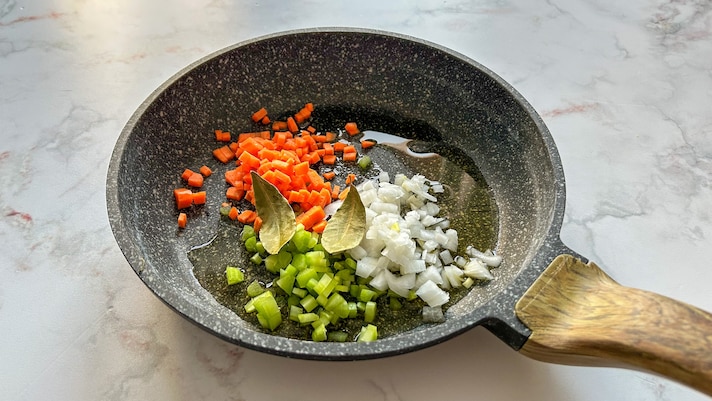
Clean and finely chop the white onion, the celery coast and the carrot, then combine everything in a pan with a drizzle of extra virgin olive oil and two bay leaves.
Clean and finely chop the white onion, the celery coast and the carrot, then combine everything in a pan with a drizzle of extra virgin olive oil and two bay leaves.
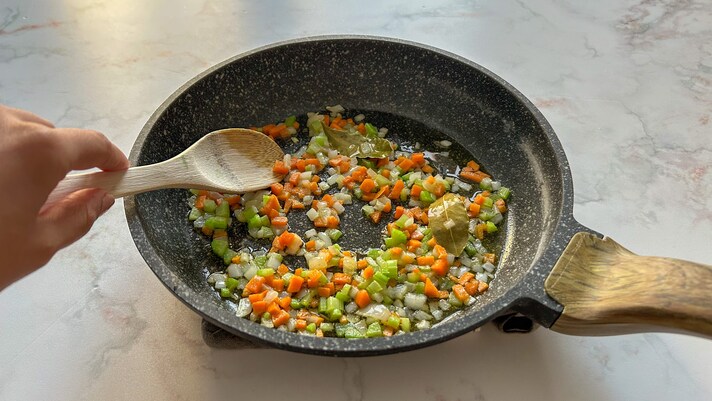
Let them fry for 2-3 minutes on a high flame.
Let them fry for 2-3 minutes on a high flame.
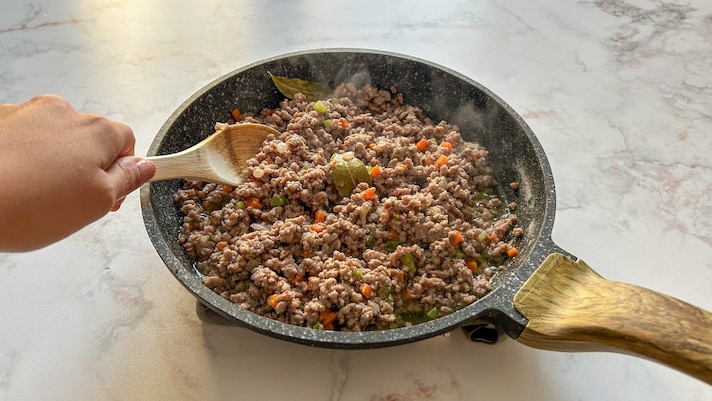
Add the minced pork and spread the cornstarch, then mix well and let it brown for a few minutes, until the meat takes on a nice brown color.
Add the minced pork and spread the cornstarch, then mix well and let it brown for a few minutes, until the meat takes on a nice brown color.
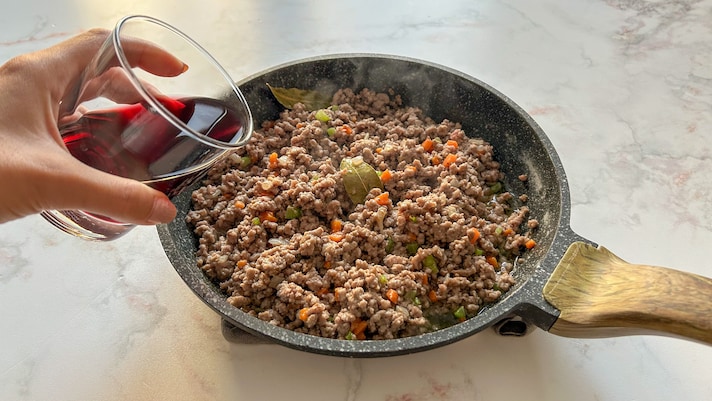
Blend with red wine and wait until the alcohol has completely evaporated.
Blend with red wine and wait until the alcohol has completely evaporated.
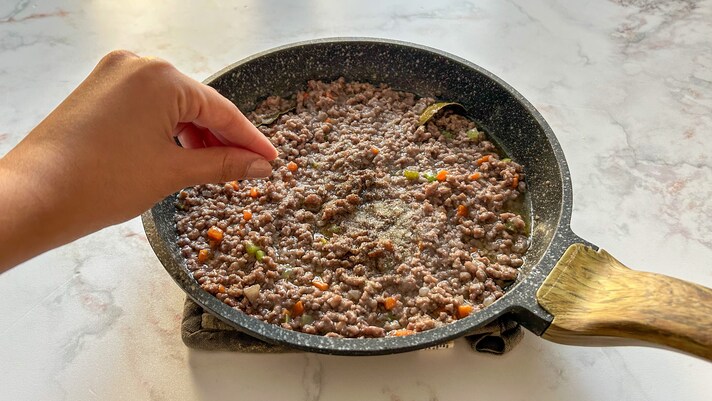
Season with salt and pepper, and lower the heat.
Season with salt and pepper, and lower the heat.
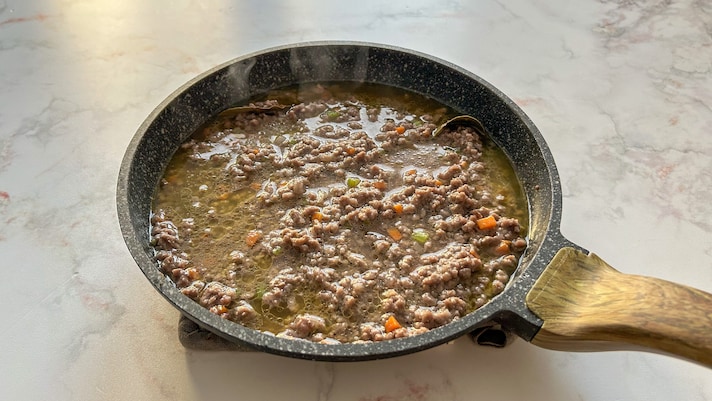
Also pour in the boiling vegetable broth.
Also pour in the boiling vegetable broth.
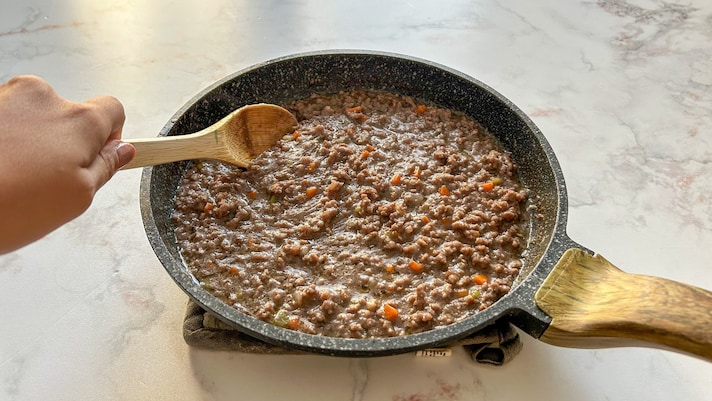
Cover with a lid and cook for 15 minutes, then continue cooking, without the lid, for another 15 minutes, stirring occasionally; the filling should not be water, but rather dense and reduced.
Cover with a lid and cook for 15 minutes, then continue cooking, without the lid, for another 15 minutes, stirring occasionally; the filling should not be water, but rather dense and reduced.
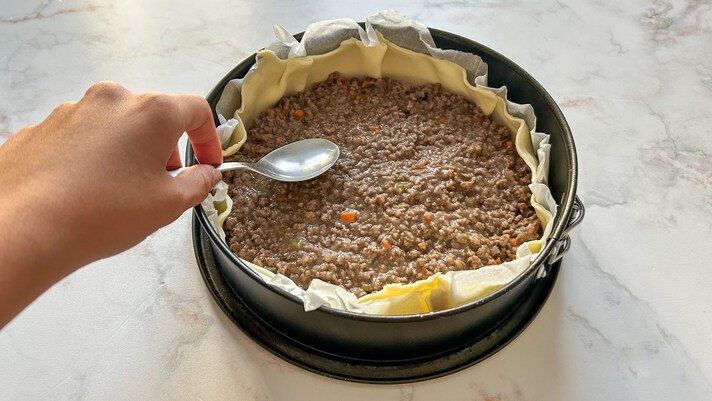
Roll out the shortcrust pastry and transfer it, with its parchment paper, into a 22cm (8 inch.) diameter springform pan; if necessary, remove the excess edges and fill with the filling, leveling it with the back of a spoon to give it a uniform thickness.
Roll out the shortcrust pastry and transfer it, with its parchment paper, into a 22cm (8 inch.) diameter springform pan; if necessary, remove the excess edges and fill with the filling, leveling it with the back of a spoon to give it a uniform thickness.
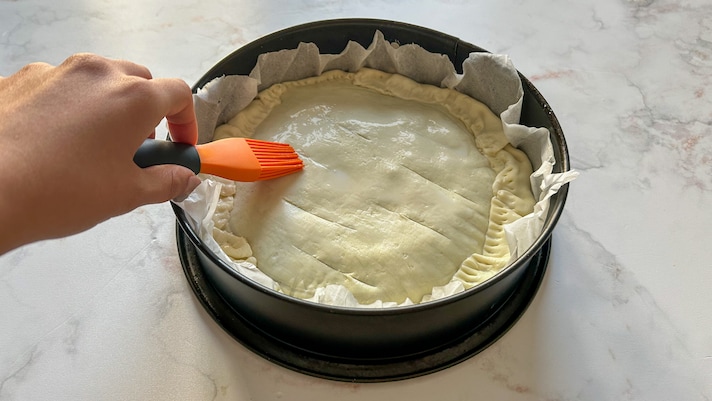
Cover everything with the roll of puff pastry and seal the edges well, pressing with the prongs of a fork; make some cuts on the surface, to allow the steam to escape during cooking, and brush with a few drops of milk.
Cover everything with the roll of puff pastry and seal the edges well, pressing with the prongs of a fork; make some cuts on the surface, to allow the steam to escape during cooking, and brush with a few drops of milk.
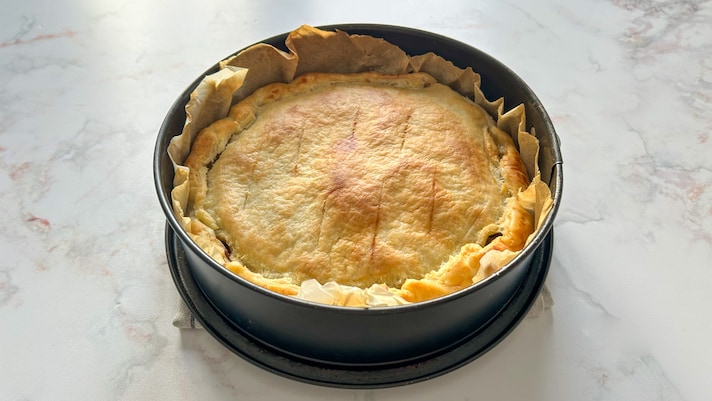
Bake the steak pie at 360°F/180°C for 30 minutes; take it out of the oven when the surface is golden brown and let it rest for about 30 minutes before cutting it.
Bake the steak pie at 360°F/180°C for 30 minutes; take it out of the oven when the surface is golden brown and let it rest for about 30 minutes before cutting it.
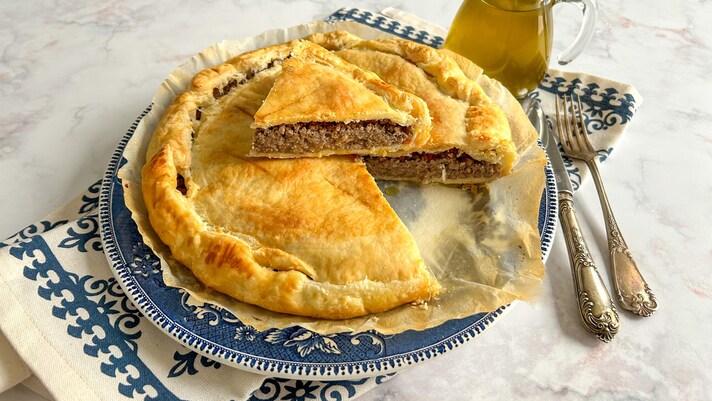
Enjoy!
Enjoy!
;Resize,width=767;)
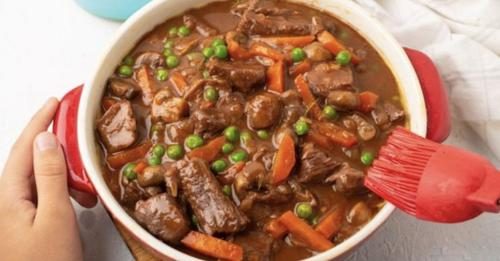;Resize,width=712;)
;Resize,width=712;)
;Resize,width=712;)
